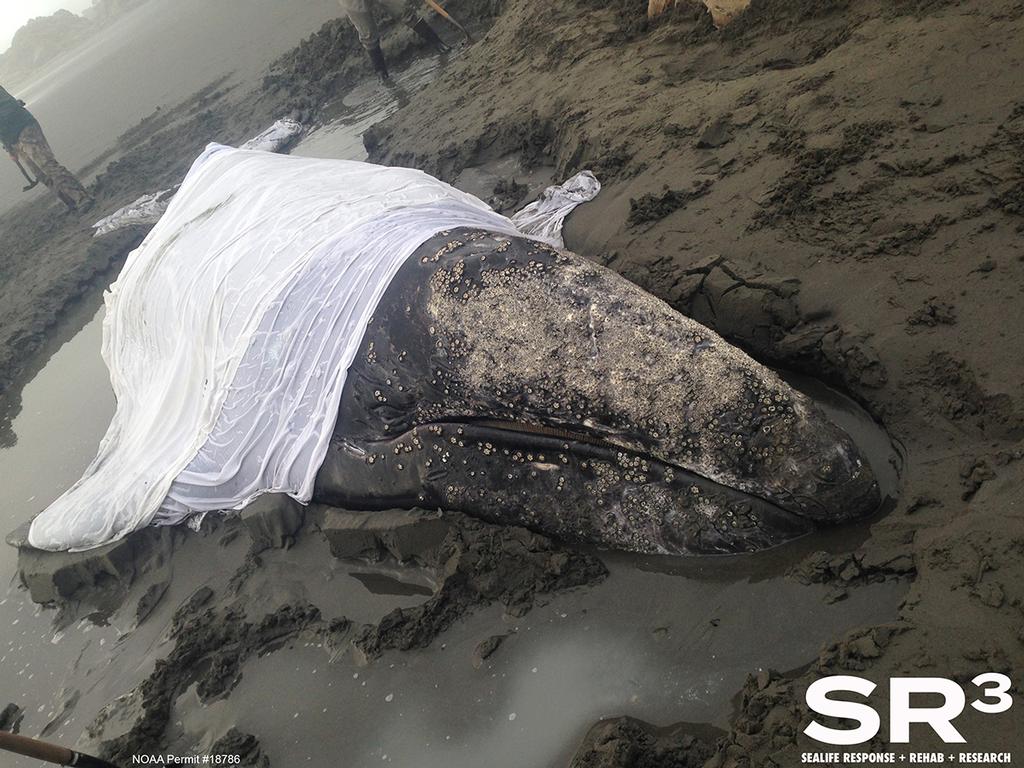Rescue effort frees whale stranded in Olympic National Park
by NOAA Fisheries on 31 Aug 2017

A white sheet helped protect the whale from sunburn and keep it damp during the three days it was stranded on the beach in Olympic National park. SR3 under NOAA Permit #18786
A rescue effort during high tide late Saturday, August 19, freed a young gray whale that had been stranded on a remote beach in Olympic National Park and Olympic Coast National Marine Sanctuary for about three days.
Responders from NOAA Fisheries' West Coast Marine Mammal Stranding Network and Olympic National Park fashioned a harness around the whale linked to pulleys anchored lower on the beach and on the shore. Experts from
Cascadia Research Collective,
SR3, and the
Washington Department of Fish and Wildlife led responders in using the pulley system to turn the whale seaward and pull it into deeper water.
The team also dug a shallow trench around the whale to help float and position the whale as the tide came in. They had hoped the especially high tide at 10:19 p.m. would give the 24-foot whale its best chance of safely returning to the open ocean.
The mission at one point seemed like it was failing with little progress made and the whale not seeming to be able to help and even appearing to turn back toward shore,” said John Calambokidis of Cascadia Research Collective. “Then, at the last possible moment, with the whale in about four feet of water in the surf and the harness released, the whale started to swim.”
“A cheer went up in the darkness and the assembled team stood shining lights into the darkness and mist, stunned at the apparent turn of events and success,” Calambokidis recalled.
Experts estimated the whale as one to two years old, and in fair condition. Although the whale was earlier described as female, it is now believed to be a male and a genetics sample will help confirm. The whale remained alert throughout the stranding and tried aggressively to free itself several times during earlier high tides.
Historically it is unusual for large whales to be successfully freed when stranded. “This success demonstrates the dedication of many members of our stranding network, who quickly dropped everything to come to the aid of this animal,” said Lynne Barre, branch chief for Protected Resources in NOAA Fisheries West Coast Region’s Seattle Office. “It was wonderful to see multiple organizations working together, the Olympic National Park contributed staff and managed logistics, and the public also helped by keeping back from the operation so the responders could do their important work.”
Researchers took photographs of the whale so they can continue to watch for it off the West Coast based on its individual characteristics. Olympic National Park staff are also surveying beaches in case the whale becomes stranded again.
“Whales are not designed to be out of water so their organ systems rapidly decline when beached and medical care is essential,” said Lesanna Lahner, wildlife veterinarian from SR3, a marine mammal rescue organization. “To help him over these hurdles, supportive medications such as B vitamins and anti-inflammatories were administered.”
Lahner and Washington Department of Fish and Wildlife marine mammal biologist Dyanna Lambourn administered the medications.
NOAA Fisheries removed gray whales from the endangered species list in 1994 and estimates the population that migrates along the West Coast of the United States at about 20,000. Gray whales typically travel north from their Mexican breeding grounds to Arctic feeding grounds in spring and early summer.
Gray whales are unusual among whales in that they regularly feed in shallow waters. Several gray whales have been seen in recent months feeding in the vicinity of the stranding, which is in Olympic National Park and Olympic Coast National Marine Sanctuary.
Rescuing large whales is inherently dangerous for both the animals and responders, and members of the marine mammal stranding network are highly trained in marine mammal biology and health, safety protocols, and emergency response procedures. NOAA Fisheries reminds the public not to approach stranded marine mammals and instead report them to the West Coast Marine Mammal Stranding Network hotline at 1-866-767-6114.
If you want to link to this article then please use this URL: www.sail-world.com/156856